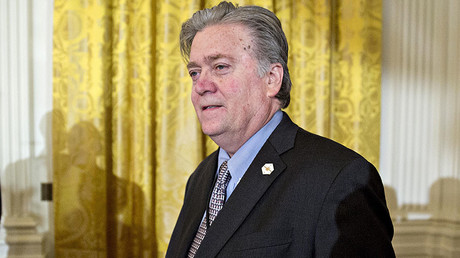Trump turmoil proves NATO & Western order is so yesterday
Finian Cunningham (born 1963) has written extensively on international affairs, with articles published in several languages. Originally from Belfast, Ireland, he is a Master’s graduate in Agricultural Chemistry and worked as a scientific editor for the Royal Society of Chemistry, Cambridge, England, before pursuing a career in newspaper journalism. For over 20 years he worked as an editor and writer in major news media organizations, including The Mirror, Irish Times and Independent. Now a freelance journalist based in East Africa, his columns appear on RT, Sputnik, Strategic Culture Foundation and Press TV.

With typical bluster of a real estate dealer, US President Trump claimed this week that his administration was a 'finely-tuned machine'. A nervous Europe and a disappointed Russia suggest something more precarious.
The business magnate turned president claims that the corporate news media in the US and Europe are determined to disparage his month-old administration as “chaotic”. He has a valid point too.
Trump says relentless allegations of a “Russian connection” to his political aides are a “ruse” contrived by the media opposed to his presidency. The resignation of his top National Security Adviser Michael Flynn last week over allegations that he talked with a Russian diplomat before Trump’s inauguration on January 20 was, in the president’s view, a case of media-driven crisis.
Trump has rebuffed media claims of chaos in his administration as overblown and betrays an agenda to undermine his presidency. He counters by pointing to a stream of executive orders signed during the first weeks of office as evidence that his presidency is achieving more than any other administration towards the stated goal of “making America great again”.Trump is adamant, with hallmark brusqueness, that he’s running a finely-tuned machine.
However, unofficial news seeping out of the White House tells a different story. A NPR correspondent this week quoted an insider in the West Wing as saying that the administration was a “train wreck”. Empty desks, disenchanted staffers, lack of leadership were said to be taking a toll on efficient running of Trump’s administration.
The resignation of Michael Flynn and the debacle of a successor, Vice Admiral Robert Harward, turning down the National Security post is an outward expression of bedlam at the White House.
When Trump hosted Israeli premier Benjamin Netanyahu this week at the White House it was obvious that the president was not adequately briefed. His non-committal quip of “I like whatever solution Bibi and the Palestinians like” was a cringing admission that Trump was clueless. And that cluelessness stemmed from not having a National Security Adviser to get him up to speed on the issues.
That was just one of several practical examples in the foreign policy realm that raise questions about the Trump White House and whether it will derail sometime soon.
“Mixed signals” is perhaps a charitable way to describe a Trump presidency in turmoil. The number of countries unnerved by Trump’s mercurial style range from allies to foes alike, from Mexico, Canada, Japan, South Korea, to China, Venezuela and Iran.
Not least unnerved are the Europeans who supposedly share a much-vaunted “transatlantic bond” with America, manifested in the NATO military alliance.
The dominant foreign policy theme last week could be dubbed “America’s reassurance tour of European allies”. US Secretary of State Rex Tillerson, Defense Secretary James Mattis and Vice President Mike Pence were all in European capitals, each keenly trying to calm anxieties elicited by Donald Trump’s earlier critical comments about the European Union and NATO.
Mattis and Pence separately addressed the Munich Security Conference and gushingly told delegates that President Trump was fully committed to NATO and the “transatlantic bond”.
European leaders were not entirely convinced, still reeling from the earlier comments by Trump in which he described NATO as “obsolete” and praised Britain for its referendum decision last year to exit from the EU bloc. In particular, Trump’s scathing attack on Germany for using the EU as a vehicle to boost its national economy at the expense of others has caused deep wounds in Berlin.
Despite reassurances from the senior US officials, Germany’s Chancellor Angela Merkel warned that the Trump presidency must not undermine European cohesion through its seeming predilection for populist, nationalist parties wanting to break up the bloc.
Trump’s ambiguity partly stems from his personal style of doing business. Trump appears to be running the White House and US government as if he is still commanding a private business. He is surrounded by a coterie of unelected advisers ranging from the populist Steve Bannon as chief strategist, to his son-in-law Jared Kushner as “special adviser”. Trump also has a tendency to drive competition for attention among his aides.
That enigmatic style is how presidential positions on any number of issues can seem to cut across those of his cabinet. For example, Bannon is understood to share political sympathies with anti-EU political parties, such as Marine Le Pen’s Front National in France.
The trouble is that in trying to smooth out Trump’s policies into a more traditional form, US officials are at risk of overcompensating, to the point where it has unintended damaging impacts.
As if to prove President Trump’s commitment to NATO, Pentagon chief James Mattis described the alliance as the “bedrock” for transatlantic security and called on European members to boost their military spend. Mattis said that the US could no longer shoulder the financial burden of maintaining the pact and that EU members would have to step up to the plate. He gave them one year to lift military spend from an average EU level of 1.4 per cent to 2.0 per cent of GDP.
While some European politicians, like British defense secretary Michael Fallon and German counterpart Ursula von der Leyen publicly endorsed this US rallying call, other EU figures were leery. European Commission President Jean-Claude Juncker said the EU must resist American pressure to boost military expenditure. The bloc’s foreign policy chief Federica Morgherini said that the issue of “security” should be measured not just in military terms, but in social and economic development for the EU and regions.
If European members were to respond to Washington’s galvanizing NATO calls, extra annual spending would be in the order of $100 billion. That will inevitably levy disastrous strains on European economies already struggling with austerity, stoking even more populist revolt.
The American officials visiting Europe this week also appeared to overcompensate for Trump’s mixed signals by taking an adversarial line on Russia. Trump has repeatedly called for normalizing relations with Moscow and has even spoken about “trusting” Germany’s Angela Merkel equally with Russian President Vladimir Putin.
At the Munich conference, Merkel said Washington should not put Russia on the same footing as European allies – in a thinly veiled riposte to Trump. This European lament seemed to result in Mattis and Vice President Pence talking tough on Russia. Mattis provocatively referred to an “arc of instability on NATO’s periphery”, while Pence warned that Moscow would be held accountable for Ukraine’s conflict.
Russian foreign minister Sergey Lavrov stood out as the only adult in the room, when he told the Munich gathering that the US and Europe needed to move beyond a West-versus-the-Rest view of the world. Lavrov inferred that this Western order was not only anachronistic, but was destabilizing and counterproductive to the reality of a functioning multipolar globe.
Trump’s ambiguity – or administrative chaos – is hardly going to stop unnerving European allies. Reassurances by his top officials seem rather to only complicate matters further. And there is a real danger that overcompensating for Trump-induced turmoil might, regrettably, undo a much-needed opportunity to normalize relations with Russia.





Geen opmerkingen:
Een reactie posten